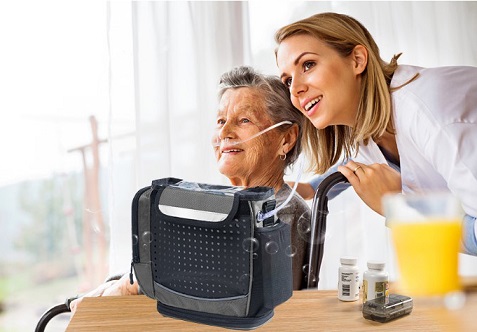Nikhil Prasad Fact checked by:Thailand Medical News Team Nov 08, 2024 1 year, 1 month, 3 weeks, 6 days, 4 hours, 21 minutes ago
Medical News: Long COVID continues to baffle scientists and frustrate patients. Many individuals who had mild or moderate COVID-19 report persistent symptoms that affect their daily lives. Among these lingering issues, cognitive problems - often referred to as "brain fog" - are widely reported. This
Medical News sheds light on a recent study conducted by researchers from the Montreal Heart Institute and the Montreal Health Innovations Coordinating Center-Canada, in collaboration with Inogen in California-USA, that explores whether oxygen therapy could help alleviate cognitive issues in long COVID sufferers.
 Oxygen Therapy Shows Promise in Addressing Cognitive Symptoms in Long COVID
The Study: Portable Oxygen Therapy in Focus
Oxygen Therapy Shows Promise in Addressing Cognitive Symptoms in Long COVID
The Study: Portable Oxygen Therapy in Focus
The research team investigated if providing additional oxygen to long COVID patients could help them think more clearly and potentially improve cognitive function. The study involved 21 participants who were given oxygen through portable oxygen concentrators for three hours daily over two weeks. For comparison, they also experienced two weeks of standard care without any supplemental oxygen.
Understanding the Methods Behind the Study
Researchers used a variety of tests to assess cognitive function, including the Montreal Cognitive Assessment (MoCA), which evaluates different aspects of cognition like memory, attention, and executive function. They also used tools to measure depressive symptoms, anxiety levels, and functional status. Oxygen levels in the brain and peripheral regions were measured using specialized devices during both rest and treadmill exercise.
Cognitive Test Findings: Improvements in Key Areas
One of the most intriguing findings was that participants using oxygen therapy showed slight improvements in cognitive scores on specific tests. The MoCA results hinted at better performance, particularly in areas related to visuospatial/executive skills and attention. These findings align with common cognitive complaints from long COVID patients, suggesting that oxygen therapy might support improvements in attention and mental clarity. However, the overall impact on memory and other cognitive functions was limited, as many patients were already performing within a normal cognitive range at the study's start.
Mood and Mental Health Benefits of Oxygen Therapy
In addition to cognition, the study explored how oxygen therapy impacted participants' psychological health. Patients using oxygen reported feeling slightly less depressed than those who did not receive supplemental oxygen. This was particularly noticeable in areas tied to enjoyment of daily activities and the ability to concentrate - both of which are significant struggles for long COVID patients. The study found that portable oxygen concentrators could have a subtle yet positive impact on mental health, reducing some depressive symptoms, particularly feelings of detachment or inability to concentrate.
Oxygen Levels During Exe
rcise: No Significant Change Noted
The research measured cerebral and peripheral oxygen saturation during both rest and exercise, aiming to see if oxygen levels improved significantly with supplemental therapy. Surprisingly, no substantial changes were observed in these oxygen levels during either period. This suggests that while portable oxygen therapy may help certain cognitive and mental health areas, it does not necessarily boost oxygen levels in the brain or body during physical activity.
Long COVID and Ongoing Mystery of Cognitive Symptoms
Long COVID affects multiple body systems, creating complex issues beyond physical symptoms like fatigue. Cognitive symptoms are particularly troubling for patients and can range from simple forgetfulness to severe difficulty with problem-solving and focusing. Current hypotheses on long COVID suggest that oxygen deprivation in brain tissues might be partly responsible for the cognitive issues. This study points towards the possibility that providing more oxygen, even at a portable level, could help alleviate some cognitive symptoms and improve overall quality of life.
Participant Experience with Portable Oxygen Therapy
Participants reported positive feedback about the oxygen therapy device’s usability, indicating that the portable concentrators were user-friendly and easy to incorporate into daily life. This acceptance is crucial, as any potential treatment for long COVID must be manageable for patients to use consistently. In total, 70% of participants found the device’s size and weight acceptable, and almost all participants agreed that it was easy to operate.
Conclusions and Future Implications
In conclusion, the study highlights the potential for portable oxygen therapy to provide subtle benefits for cognitive function and mental health in individuals struggling with long COVID. While it does not appear to directly impact oxygen saturation levels during physical activity, it may still offer support in specific cognitive and emotional areas. Future research with larger sample sizes and longer follow-up periods is essential to determine the full benefits of oxygen therapy and to confirm these preliminary findings.
The study findings were published in the peer-reviewed journal: PLOS ONE.
https://journals.plos.org/plosone/article?id=10.1371/journal.pone.0312735
For the latest COVID-19 News, keep on logging to Thailand
Medical News.
Read Also:
https://www.thailandmedical.news/news/mild-to-moderate-covid-19-can-cause-pulmonary-diffusing-capacity-issues-and-shortness-of-breath
https://www.thailandmedical.news/news/polish-study-finds-that-covid-19-causes-diaphragmatic-dysfunction
https://www.thailandmedical.news/news/new-genetic-insights-show-that-hla-g-variant-linked-to-post-covid-exercise-breathing-issues
